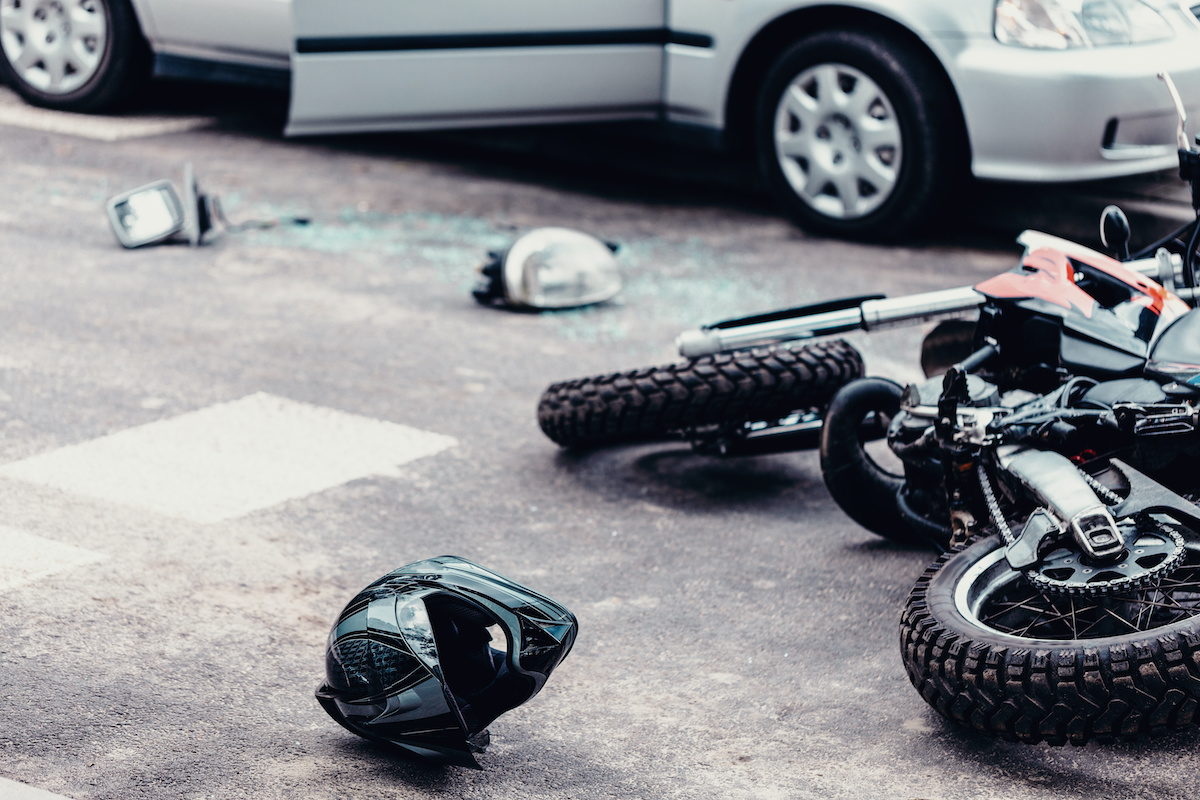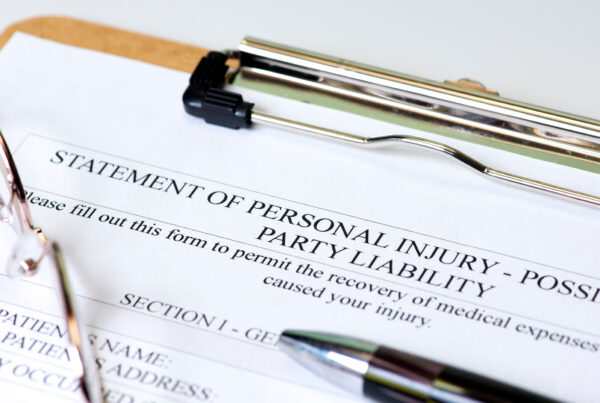Motorcyclists make up over 8% of all drivers in the United States, noted by the Motorcycle Industry Council in 2018, which is the highest ever recorded. As the freedom and beauty of riding a motorcycle are felt and appreciated by more Americans, the risk of motorcycle accidents increases with more motorcyclists. Unfortunately, motorcyclists are vulnerable drivers and can come across dangerous situations of their own making, of course, but commonly at the negligence or oversight of other drivers. It is important to understand the dangers motorcyclists face as both motorcycle owners and car drivers to ensure we do not participate in or contribute to potentially fatal accidents.
What are the Top Causes of Motorcycle Accidents?
First on the list is driver negligence, as this contributes to most motorcycle accidents in some way. Whether it is an unsafe lane change, car doors opening without a driver properly checking their blind spots, sudden stops, or right-of-way errors, all failures of drivers to properly comply with the rules of the road contribute to motorcycle and car accidents. This can also be turned on the motorcyclist, and we implore motorcyclists to be aware of their surroundings and to ensure there is proper space between you and the car ahead.
To be aware of your surroundings is to also be aware of the weather and road hazards. Inclement weather, including fog, rain, and snow, accounts for a fair number of motorcycle accidents. To have situational awareness is to check the weather forecast and determine if your individual motorcycle can handle those conditions. Slippery roads or low visibility can put motorcyclists at increased risk of causing, contributing to, or being the victim of an accident. Keeping a careful eye on the road itself is incredibly important as potholes, loose gravel, construction debris, and trash are dangerous road hazards that can cause motorcyclists to lose control and crash.
For both motorcyclists and car drivers alike, we must all keep in mind that a blood alcohol content (“BAC”) of 0.08% or higher constitutes a DUI in all states. Driving under the influence results in astronomically high numbers of accidents, and accidents involving DUI for motorcyclists are no different. Carefully consider whether you, as a driver or motorcyclist, have reached this point and always have a designated driver with you. DUI-related accidents are 100% preventable and present a real danger to all drivers around you.
Lastly, vehicle part defects are possible and can cause or contribute to an accident. Whether a part defect is on a car or on a motorcycle, it is important to keep an eye out for malfunctions in your vehicle and stay updated on recalled parts.
Motorcycle Accident Injury Statistics
Those who ride understand there are inherent risks of motorcycle riding, but even the most responsible riders can encounter dangerous situations that put them at risk. According to the National Safety Council, motorcyclists accounted for 14 percent of all traffic fatalities despite making up only three percent of all registered vehicles in the U.S. Fatalities of motorcycle riders and passengers saw an increase of eight percent from 2020 to 2021, and over the last 10 years, death rates increased 29 percent with 30.05 motorcycle fatalities per 100 million vehicle miles. In 2021, the majorty of fatalities associated with motorcycle accidents occured on urban roads, in good weather, at nighttime, with another vehicle, and even while wearing helmets. In terms of injuries, 82,528 motorcyclists were injured in 2020, totaling 468 injuries per 100 million vehicle miles traveled.
Common Motorcycle Injuries
Common injuries from motorcycle accidents are very serious as the rider is more vulnerable than the average driver. Even with helmets, traumatic brain injury is possible as high speeds can cause the head to hit the ground or an object harder than the body can handle. As these accidents are incredibly traumatic for the body, spinal cord injuries, including paralysis, internal injuries, such as bleeding and organ ruptures, bone fractures, and road rash, which can lead to infection, are common.
It is important for motorcyclists and car drivers to be aware of their surroundings, respect the rules of the road, and carefully consider the consequences of their actions as accidents involving motorcycles can be life-altering in the worst ways imaginable. For motorcyclists who have been involved in an accident, it is important to obtain representation to navigate the legal processes ahead of you.
How Do You Avoid Motorcycle Accidents?
Just like any other vehicle accident, some motorcycle accidents can be unavoidable. However, drivers who follow the rules of the road can help improve motorcycle accident prevention. Much of the motorcycle safety tips are geared towards riders themselves, although automobile drivers can do their part by always being aware of their surroundings, checking blind spots thoroughly, not tailgating, and following the rules of the road in general.
For riders, there are a few motorcycle safety tips and things you can do to avoid being involved in a motorcycle accident:
- Be Visible: Make yourself as visible as possible to others on the road by wearing bright colors or reflective clothing, using your headlight at all times, and even adding reflective tape or decals to the bike. Also, be sure to ride in a lane position that makes you highly noticeable, especially at intersections and during lane changes.
- Ride Defensively: Always be under the assumption that other drivers don’t see you or aren’t accurately judging your speed. Stay alert, always watch the road ahead, and be prepared to react to any potential hazards. This includes keeping a safe following distance, anticipate merging or turning without signals, and prepare for evasive action.
- Follow Traffic Laws: This one should go without saying. Traffic laws are in place for everyone’s safety. Respect speed limits, stop signs, and traffic signals. Avoid aggressive maneuvers, like speeding or weaving through traffic. Ride within your skill level and never do so under the influence of drugs or alcohol.
- Invest in Training & Education: Even for those who’ve been riding for awhile, continuously improving riding skills through formal training can enhance your ability to navigate challenging situations. There are motorcycle safety courses that focus on defensive riding techniques, hazard recognition, and even emergency maneuvers. The education can also keep you informed regarding motorcycle-specific laws and regulations.
- Wear Protective Gear: Although it’s not legally required in every state, it’s important to always wear a DOT-approved helmet. It will be the most important, most effective piece of safety equipment you will ever invest in. You should also look into high-quality safety gear such as jackets, pants, gloves, and boots that are designed to provide protection in the event of an accident. These may include features such as abrasion-resistant materials, padding, and armor which can significantly reduce the severity of injuries during a crash.
- Be Mindful of Road Conditions: Stay vigilant and adapt your riding to any changing road conditions, whether due to weather conditions or location. Maintain proper tire pressure and tread depth and be sure to regularly inspect your bike for any maintenance issues that could end up compromising your safety.
Do you need an attorney after a motorcycle accident?
With the pain and suffering endured at the hands of someone else, motorcyclists need experienced, expert motorcycle injury attorneys in St. Louis. The traffic accident attorneys at The Simon Law Firm, P.C. are the expert attorneys in this field and are prepared to hear your story, explain and discuss your options, and stand by you through every part of the litigation. If you or a loved one has been involved in a motorcycle accident, please contact The Simon Law Firm, P.C. today to have a free, confidential consultation.







